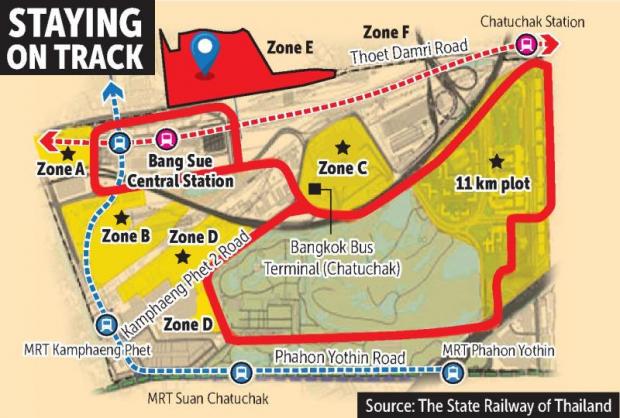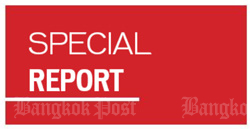The debt-ridden State Railway of Thailand (SRT) is ramping up efforts to lease its three prime land plots in Bangkok to be used for a 400 billion-baht commercial development project in a bid to bolster revenues.

The three plots are a site near Mae Nam railway station in Klong Toey district, projected to require 200 billion baht of investment; a plot in Makkasan, expected to need a 100-billion-baht investment; and the Bang Sue Central Station, also predicted to require at least 100 billion baht in investment.

The lease concessions are set to last for 50 years.
The Joint State and Private Investment Act, which came into force on March 10, opens the door for the SRT to lease its land to private developers instead of relying on Public-Private Partnership (PPP) deals, said SRT acting governor Worawut Mala.
The move would allow the SRT to call for an open bid for land leases without having to undergo an evaluation process with the PPP committee, the State Enterprise Policy Office and the cabinet. The scheme only needs to be approved by the SRT's board and the Transport Ministry.
Under the scheme, private developers must shoulder the business risks by themselves and set aside a portion of revenue for the SRT under the varying rates, according to the earning potential of each area, Mr Worawut said.
Referring to Bang Sue Central Station, Mr Worawut said various investors from Japan expressed interest in commercially developing Zone A, a 32-rai plot, with an estimated investment of 11 billion baht. They made several inquiries about it, the acting governor said.
Foreign companies can participate in the bidding process, but they will be required to form a joint venture with Thai firms and hold less than 50% of the ownership, he said. He said the SRT also invited Japanese firms to take part in a bid to develop other zones, such as Zones E and D.
According to Mr Worawut, the terms of reference (ToR) of bidding for Zone A's development have been made public on the SRT website. The bid envelopes are due to be sold on April 9 for 500,000 baht each. Bidders are required to submit the envelopes on July 30, he said.
This scheme, he stressed, is in high demand because it is close to state offices and Siam Cement Group's main office, which has over 8,000 staff. He noted that the areas surrounding Bang Sue Central Station have good business potential, as there are no major shopping malls or retail stores yet.
Regarding other zones subject to bids, the SRT's consultants suggested a 270-rai land plot east of the station, called "KM 11", to be included in the options.
This area would require an estimated 100 billion baht in investment. Bidding for the land lease could take place next year. Other zones -- B, C and D -- could be slated for bidding between 2024 and 2029.
Mr Worawut said another 120-rai area north of the station is being studied by the SRT for its potential to allow private investors to develop the location. They estimate that Zones E and F have a total land value of up to 80 billion baht.
According to Mr Worawut, the developer is obliged to construct office buildings and accommodation for the SRT staff in exchange for a contract to commercially develop the land, ranging from offices and residential buildings to retail stores and shopping spaces.
In the first phase of development, which would take place between 2022 and 2025, more than 1,000 office and residential buildings would be constructed, Mr Worawut said.
The feasibility study for the scheme is likely to be concluded this year.